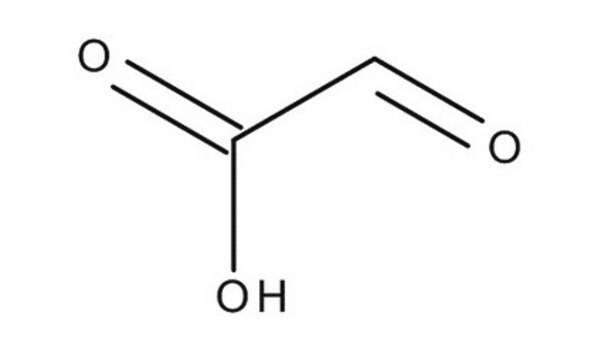1.00804
L(+)-Tartaric acid
for analysis EMSURE® ACS,ISO,Reag. Ph Eur
Sinónimos:
L(+)-Tartaric acid, 2,3-Dihydroxybutanedioic acid
About This Item
Productos recomendados
grade
ACS reagent
Quality Level
agency
reag. ISO
reag. Ph. Eur.
suitable for EPA 200.7
suitable for EPA 200.8
vapor pressure
<5 Pa ( 20 °C)
product line
EMSURE®
assay
≥99.5-101.0% dry basis (alkalimetric)
form
solid
autoignition temp.
425 °C
impurities
≤10 ppm Phosphate (PO4)
≤100 ppm Sulfated ash
≤20 ppm Total sulfur (as SO4)
≤350 ppm Oxalic acid
≤5 ppm Chloride (Cl)
≤50 ppm Insoluble matter
≤50 ppm Sulfate (SO4)
loss
≤ 0.2% loss on drying, 105°C
pH
1.6 (25 °C, 100 g/L in H2O)
mp
168-170 °C
transition temp
flash point 210 °C
solubility
water: 1390 g/L at 20 °C
density
1.76 g/cm3 at 20 °C
bulk density
1000 kg/m3
cation traces
Ca: ≤20 ppm
Cu: ≤5 ppm
Fe: ≤5 ppm
Pb: ≤5 ppm
heavy metals (as Pb): ≤5 ppm
storage temp.
2-30°C
InChI
1S/C4H6O6/c5-1(3(7)8)2(6)4(9)10/h1-2,5-6H,(H,7,8)(H,9,10)
InChI key
FEWJPZIEWOKRBE-UHFFFAOYSA-N
Application
- Binary Mixtures of Meloxicam and L-Tartaric Acid for Oral Bioavailability Modulation of Pharmaceutical Dosage Forms.: This study explores the use of L(+)-tartaric acid in binary mixtures to enhance the oral bioavailability of meloxicam, suggesting potential applications in developing more effective pharmaceutical formulations (Macasoi et al., 2024).
- Hyper-Raman spectroscopy of biomolecules.: This research employs Hyper-Raman spectroscopy, an analytical technique enhanced by L(+)-tartaric acid, to provide insights into the structural dynamics of biomolecules, showcasing its utility in complex biological systems (Marble et al., 2024).
- Novel multi-component crystals of berberine with improved pharmaceutical properties.: This study highlights the use of L(+)-tartaric acid in the development of novel multi-component crystals, potentially leading to pharmaceuticals with enhanced efficacy and stability (Zhang et al., 2023).
- Deep Eutectic Solvent (DES)-Mediated One-Pot Multicomponent Green Approach for Naphthalimide-Centered Acridine-1,8-dione Derivatives and Their Photophysical Properties.: Research demonstrates the synthesis of complex organic compounds using L(+)-tartaric acid as a component of a deep eutectic solvent, highlighting its role in green chemistry (Rather et al., 2022).
Linkage
Analysis Note
Assay (alkalimetric, calculated on dried substance): 99.5 - 101.0 %
Identity: passes test
Appearance of solution: passes test
Insoluble matter: ≤ 50 ppm
Spec. rotation [α²0/D (20 %; water calculated on dried substance): 12.0 - 12.8 °
Chloride (Cl): ≤ 5 ppm
Phosphate (PO₄): ≤ 10 ppm
Sulfate (SO₄): ≤ 50 ppm
Heavy metals (as Pb): ≤ 5 ppm
Total sulfur (as SO₄): ≤ 20 ppm
Ca (Calcium): ≤ 20 ppm
Cu (Copper): ≤ 5 ppm
Fe (Iron): ≤ 5 ppm
Pb (Lead): ≤ 5 ppm
Oxalate (C₂O₄): passes test
Oxalic acid: ≤ 350 ppm
Sulfated ash: ≤ 100 ppm
Loss on Drying (105°C): ≤ 0.2 %
Corresponds to ACS,ISO,Reag. Ph Eur
Legal Information
signalword
Danger
hcodes
Hazard Classifications
Eye Dam. 1
Storage Class
11 - Combustible Solids
wgk_germany
WGK 1
flash_point_f
302.0 °F - closed cup
flash_point_c
150 °C - closed cup
Certificados de análisis (COA)
Busque Certificados de análisis (COA) introduciendo el número de lote del producto. Los números de lote se encuentran en la etiqueta del producto después de las palabras «Lot» o «Batch»
¿Ya tiene este producto?
Encuentre la documentación para los productos que ha comprado recientemente en la Biblioteca de documentos.
Los clientes también vieron
Contenido relacionado
This page is intended to make it easier to find the consumables you need based on the analytical method you’re using. Methods included on this page come from the EPA, Standard Methods and ASTM.
This page is intended to make it easier to find the consumables you need based on the analytical method you’re using. Methods included on this page come from the EPA, Standard Methods and ASTM.
This page is intended to make it easier to find the consumables you need based on the analytical method you’re using. Methods included on this page come from the EPA, Standard Methods and ASTM.
This page is intended to make it easier to find the consumables you need based on the analytical method you’re using. Methods included on this page come from the EPA, Standard Methods and ASTM.
Nuestro equipo de científicos tiene experiencia en todas las áreas de investigación: Ciencias de la vida, Ciencia de los materiales, Síntesis química, Cromatografía, Analítica y muchas otras.
Póngase en contacto con el Servicio técnico






